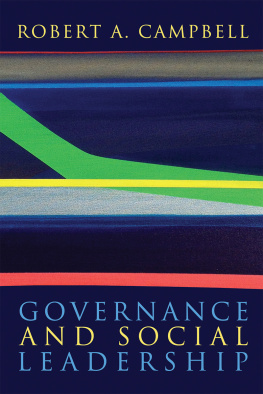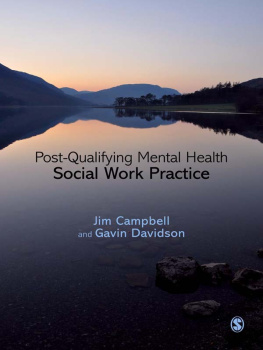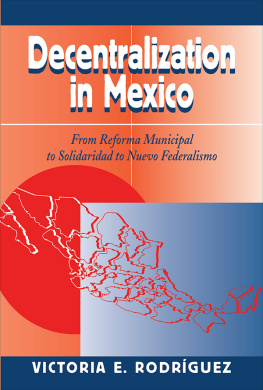Robert A. Campbell - Governance and Social Leadership
Here you can read online Robert A. Campbell - Governance and Social Leadership full text of the book (entire story) in english for free. Download pdf and epub, get meaning, cover and reviews about this ebook. year: 2014, publisher: Cape Breton University Press, genre: Romance novel. Description of the work, (preface) as well as reviews are available. Best literature library LitArk.com created for fans of good reading and offers a wide selection of genres:
Romance novel
Science fiction
Adventure
Detective
Science
History
Home and family
Prose
Art
Politics
Computer
Non-fiction
Religion
Business
Children
Humor
Choose a favorite category and find really read worthwhile books. Enjoy immersion in the world of imagination, feel the emotions of the characters or learn something new for yourself, make an fascinating discovery.
- Book:Governance and Social Leadership
- Author:
- Publisher:Cape Breton University Press
- Genre:
- Year:2014
- Rating:3 / 5
- Favourites:Add to favourites
- Your mark:
- 60
- 1
- 2
- 3
- 4
- 5
Governance and Social Leadership: summary, description and annotation
We offer to read an annotation, description, summary or preface (depends on what the author of the book "Governance and Social Leadership" wrote himself). If you haven't found the necessary information about the book — write in the comments, we will try to find it.
Governance and Social Leadership — read online for free the complete book (whole text) full work
Below is the text of the book, divided by pages. System saving the place of the last page read, allows you to conveniently read the book "Governance and Social Leadership" online for free, without having to search again every time where you left off. Put a bookmark, and you can go to the page where you finished reading at any time.
Font size:
Interval:
Bookmark:

Governance
and Social
Leadership
Governance
and Social
Leadership
Robert A. Campbell

CAPE BRETON UNIVERSITY PRESS
SYDNEY, NOVA SCOTIA
Copyright 2014 Robert A. Campbell
All rights reserved. No part of this work may be reproduced or used in any form or by any means, electronic or mechanical, including photocopying, recording or any information storage or retrieval system, without the prior written permission of the publisher. Cape Breton University Press recognizes fair dealing uses under the Copyright Act (Canada). Responsibility for the research and permissions obtained for this publication rests with the authors.
Cape Breton University Press recognizes the support of the Province of Nova Scotia, through the Department of Communities, Culture and Heritage and the support received for its publishing program from the Canada Council for the Arts Block Grants Program. We are pleased to work in partnership with these bodies to develop and promote our cultural resources.


Cover image: Miama Night, by Erin MacKeen, Toronto. NS
Cover design: Cathy MacLean Design, Pleasant Bay, NS
Layout: Mike Hunter, Port Hawkesbury and Sydney, NS
eBook development: WildElement.ca
First printed in Canada.
Library and Archives Canada Cataloguing in Publication
Campbell, Robert A. (Robert Arthur), 1952-, author
Governance and social leadership / Robert A. Campbell.
Includes bibliographical references and index.
Issued in print and electronic formats.
ISBN 978-1-897009-70-3 (pbk.).-- ISBN 978-1-927492-64-2
(pdf).--ISBN 978-1-927492-65-9 (epub).--ISBN 978-1-927942-66-6
(mobi)
1. Leadership. 2. Leadership--Social aspects. I. Title.
HM1261.C34 2014 303.34 C2014-900508-3
C2014-900509-1
Cape Breton University Press
PO Box 5300, 1250 Grand Lake Road
Sydney, NS B1P 6L2 CA
www.cbupress.ca
Governance and Social Leadership
Table of Contents
List of Figures
Preface
The ideas expressed here reflect my personal struggles over the past few decades to understand governance and leadership. My experience working in industry and the nonprofit sectors combined with my academic background in sociology, both as a student and as a faculty member, have provided me with a great deal of exposure to a variety of manifestations and understandings of these phenomena. The net result of this exposure, however, has been an increasing frustration over how little we actually know about these critical areas of public concern and how often both are abused to facilitate the pursuit of personal interest.
The actual work of trying to articulate my position on these matters emerged out of my experience developing and teaching an advanced course on leadership for students in the MBA program in community economic development, for the Shannon School of Business at Cape Breton University, in Sydney, Nova Scotia. My use of the word advanced is meant to capture two things. First, students taking the course have already completed the core business courses, including courses in organizational behaviour, leadership and community economic development. Second, the course provides the opportunity to expose students to a theoretically more challenging exploration of issues related to governance and leadershipone that raises as many questions as answers, but also develops their skills in analysis and synthesis.
That being said, this is not a textbook. It does not attempt to provide a systematic and comprehensive coverage of leadership or governance in an objective and sterile manner, with specific learning goals, sidebars, illustrations, glossaries, questions for reflection and cases for review and application. Nor is it an academic monograph, grounded in a specific theoretical framework, following a particular methodology in an attempt to prove, or at least support, some hypothesis, through the collection and analysis of data. Similarly, it is not a trade book aimed at the presumed intelligent and interested general reader, written in a familiar, if not journalistic, style, providing enthusiastic, if not particularly deep, insight into some phenomenon of interest, anchored in current events, while keeping notes and references to a minimum. Rather it has a bit of all three . Because I am an academic, and because I am concerned that all readers understand the sources of my ideas and are provided with ample direction to pursue their own interests in a more systematic and informed manner, it is somewhat pedantic in its method of presentation. At the same time, I hope that I have managed to write it in a manner that will appeal, and be of some use, to students, academics, practitioners and the general reader. More than anything else, however, it is a guidebook based on my own journey toward understanding the relationship between leadership and governance and developing the notion of social leadership.
Governance and leadership are distinct but inseparable aspects of organizational life. Regrettably, the concept of leadership has been overused to the extent of rendering it almost meaningless. Governance, most often equated with government, is well on its way to suffering the same fate. Despite our misunderstanding of these concepts, governance structures provide the environment in which leadership can emerge. The idea of social leadership captures two critical elements beyond this. First, it draws attention to the fact that the process of carrying out leadership must be one that is social. In other words, it must involve constructive interaction among those involved. Second, the product of the exercise of leadership must be social. It must contribute to social wellbeing in a substantial and sustainable way.
I want to thank the many students who have taken leadership courses from me over the last couple of decades, both in university classrooms and in other venues, for allowing me to subject them to various experiments in pedagogy, course content and ways of thinking. Thanks also to Brittany Erickson, Catherine Leviten-Reid, Jacke Scott and Janice Tulk for their helpful comments and suggestions throughout the writing process.
Robert Campbell, Sydney, Nova Scotia, May 2014
1. Setting the Stage
Briefly stated, there are three reasons for you to read this book. First, rather than providing another theory of leadership, I am offering a new model of how to understand leadershipone that hinges on a particular interpretation of the word social. Second, I dare to explore not just one of the most overused and least understood concepts in the organizational studies vocabulary (leadership), I also tackle the increasingly used but equally misunderstood concept of governance. Third, I am making a deliberate effort to be troublesome.
One of the ways that I mean to be troublesome is through the introduction of disparate ideas from a variety of academic disciplines (arts, humanities, natural and social sciences) and realms of experience (family, school, work, play and community), many of which are not frequently used in discussions of leadership. Some of these ideas should immediately seem germane to the subject matter at hand, while others may appear to be trivial or superfluous. I learned long ago not to underestimate the power of anecdote as an aid to understanding (see Solway 1991); I prefer to interpret trivial in the outdated scholastic sense of foundational, rather than in the newer unfortunate sense of superfluous, or irrelevant.
Font size:
Interval:
Bookmark:
Similar books «Governance and Social Leadership»
Look at similar books to Governance and Social Leadership. We have selected literature similar in name and meaning in the hope of providing readers with more options to find new, interesting, not yet read works.
Discussion, reviews of the book Governance and Social Leadership and just readers' own opinions. Leave your comments, write what you think about the work, its meaning or the main characters. Specify what exactly you liked and what you didn't like, and why you think so.












